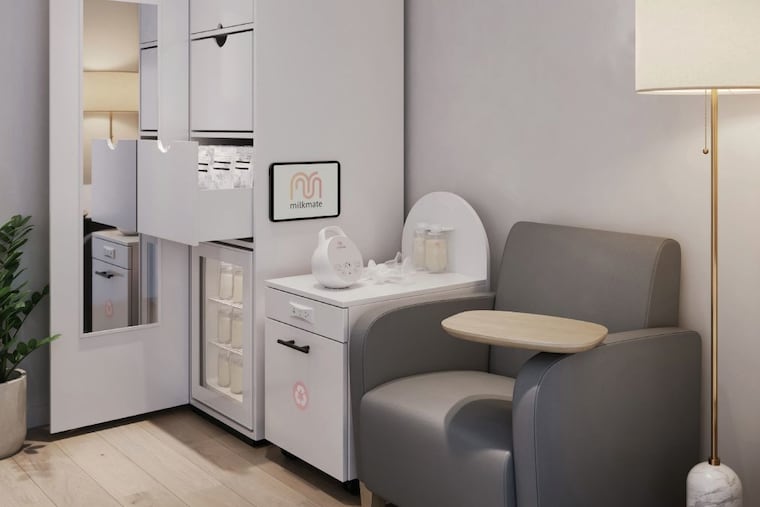Can breastfeeding at work get easier? A Philly native’s lactation start-up says yes.
The mother of four, "obsessed with time," saw a way to make workplace lactation suites more efficient for workers. Her company just did its first installation in the Philadelphia region.

Imagine: In order to make a cup of coffee at work you must bring a coffee maker and filters from home, find a private space in the office, disrobe partially, and sit alone until the coffee has finished brewing. If you forget the machine or filters, you have to turn around and go home — borrowing one isn’t possible, and if you wait too long, coffee will begin leaking out of your body.
That’s how Patrice Meagher has described pumping breast milk to people who don’t understand the planning and preparation it requires. The company she founded in 2020, MilkMate, is looking to alleviate some of that burden for breastfeeding workers by helping their employers create functional, fully equipped lactation spaces.
“The most inefficient thing I did at work was pumping, so I’m looking to solve that,” Meagher said. “We’re looking to save women 45 minutes to an hour a day.”
Meagher, a Philadelphia-area native and mother of four, worked in commercial real estate in New York until she started MilkMate. She brought to the company her own experiences as a working parent, as well as the knowledge of how commercial buildings operate and what their tenants need.
In the short time since she launched her venture, the COVID-19 pandemic changed how employers think about office space; a formula shortage shed light on the pressures involved in feeding young children; and new federal legislation expanded workplace protections for breastfeeding workers.
Amid all that, Meagher has seen a great deal of interest in her company’s advice.
“People are yearning for information,” she said.
As offices change, lactation needs don’t
Workplace pumping rights expanded in April 2023 when the federal PUMP Act went into effect.
Employers were already required to provide pump breaks and a private, non-bathroom lactation space to hourly workers, but that excluded about a quarter of U.S. women of childbearing age. The new law added exempt workers, an estimated 9 million more people, and says employers can be sued for noncompliance.
Still, a pumping space that complies with federal law may not have all the features parents need to conveniently express milk: an electrical outlet, ability to wash and store pump parts, and refrigerator space for milk.
MilkMate’s offerings take those needs into account. They include a comfortable seat, a table, and a refrigerator. The company also developed a multiuser, closed-system breast pump that operates with single-use, recyclable pump parts and milk collection bags, which the employer can replenish as needed.
This means employees no longer have to tote their own equipment to work and sanitize it during their pump breaks. All they have to bring into the lactation suite are their own bodies, so they can shave minutes off each pump break and reclaim time spent packing, unpacking, and cleaning pump gear at home.
“I’m obsessed by time. It’s all about time,” Meagher said.
The MilkMate pump got U.S. Food and Drug Administration approval last spring, Meagher said, and the New York-based company started installations soon after. Its first Philadelphia-area installation was in December — a homecoming for Meagher, who grew up near Villanova — to be followed by more local clients this year.
Meagher has been asked a number of times if the expansion of remote work and downsizing of traditional office space gave her second thoughts about her venture. But she has remained steadfast that workplace lactation suites remain a necessity.
Many employers of breastfeeding workers have little to no remote-work capabilities. She especially sees a need at schools, college campuses, and hospitals. And hybrid workers still have to pump at the office, Meagher noted, even if it’s not every day.
“If you’re pumping, even if you go to the office one day a week, you can’t stop” for that day, Meagher said.